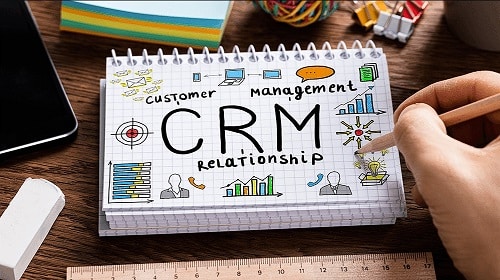1. Introduction
In today’s competitive business landscape, having a customer relationship management (CRM) system is essential for managing customer interactions, improving sales, and enhancing customer satisfaction. However, with so many CRM systems available on the market, choosing the right one for your business can be a daunting task. In this guide, we will provide you with a comprehensive outline of the factors to consider when choosing a CRM system and how to evaluate and compare different options.
2. What is a CRM system?
CRM system is software that enables businesses to manage their interactions with customers and potential customers. It is designed to improve customer retention and satisfaction by organizing customer data, automating sales processes, and providing insights into customer behavior and preferences.
3. Why is a CRM system important for your business?
A CRM system provides a centralized platform for businesses to manage their customer relationships, which can lead to improved sales, higher customer retention rates, and enhanced customer satisfaction. It can also streamline and automate various business processes, such as sales and marketing, customer service, and analytics, which can save time and increase efficiency.
4. Factors to Consider When Choosing a CRM System
When choosing a CRM system, it is important to consider various factors to ensure that it aligns with your business goals and objectives. Here are some key factors to consider:
a. Business Goals and Objectives
Before selecting a CRM system, it is crucial to define your business goals and objectives, such as increasing sales, improving customer satisfaction, or streamlining business processes. This will help you select a CRM system that aligns with your goals and can provide the necessary features and functionality.
b. Budget
CRM systems can vary significantly in price, depending on the features and functionality they offer. It is important to establish a budget for your CRM system and look for options that fit within your budget while still meeting your business needs.
c. Ease of Use
A CRM system should be easy to use and intuitive for all employees to ensure widespread adoption and maximum benefit. Look for systems with simple and intuitive interfaces, customizable dashboards, and easy-to-use features.
d. Scalability
Choose a CRM system that can scale with your business as it grows. This includes features such as the ability to add new users and functionalities, integrations with other business systems, and customization options.
e. Integration with Existing Systems
Look for a CRM system that can integrate with your existing business systems, such as your marketing automation platform or your accounting software. This will ensure that your data is centralized and can be easily accessed and analyzed.
f. Data Security and Privacy
Data security and privacy are critical when it comes to managing customer data. Look for a CRM system that offers robust security features, such as data encryption and multi-factor authentication.
g. Customer Support
Choose a CRM system with reliable customer support,
5. Types of CRM Systems
There are three main types of CRM systems: operational CRM, analytical CRM, and collaborative CRM.
a. Operational CRM
Operational CRM systems are designed to manage the day-to-day customer interactions and business processes, such as sales automation, marketing automation, and customer service. These systems are focused on improving efficiency and productivity by automating various business processes.
b. Analytical CRM
Analytical CRM systems are designed to analyze customer data to gain insights into customer behavior, preferences, and trends. This includes data such as customer purchase history, customer preferences, and demographic information. These insights can be used to improve marketing strategies, product development, and customer service.
c. Collaborative CRM
Collaborative CRM systems are designed to facilitate collaboration and communication between different departments and teams within a business. This includes sharing customer data, notes, and interactions between sales, marketing, and customer service teams to improve customer satisfaction and overall business performance.
6. How to Evaluate and Compare CRM Systems
When evaluating and comparing CRM systems, there are several key factors to consider:
a. List of Potential CRM Systems
Create a list of potential CRM systems that align with your business goals and objectives, budget, and other requirements.
b. Key Features and Functionality
Evaluate each CRM system’s features and functionality to determine which system offers the most relevant and useful capabilities for your business needs.
c. User Reviews and Ratings
Read user reviews and ratings on various platforms, such as G2, Capterra, and TrustRadius, to gain insight into the user experience and satisfaction with each CRM system.
d. Trial Periods and Demos
Take advantage of free trial periods and demos to test each CRM system and assess its ease of use, functionality, and compatibility with your business needs.
e. Implementation Process
Consider the implementation process for each CRM system, including any training or support required, to ensure a smooth transition and adoption within your business.
7. FAQs
Q: What are the most important features to look for in a CRM system?
A: The most important features to look for in a CRM system depend on your business needs and goals. However, some key features to consider include contact management, lead management, sales automation, marketing automation, customer service, and analytics.
Q: How much does a CRM system typically cost?
A: The cost of a CRM system can vary significantly, depending on the features and functionality it offers. Some systems may be available for a monthly subscription fee, while others may require a larger upfront investment.
Q: Can a CRM system integrate with other business systems?
A: Yes, many CRM systems offer integrations with other business systems, such as marketing automation platforms, accounting software, and customer support tools.
8. Conclusion
Choosing the right CRM system is crucial for improving customer relationships, increasing sales, and enhancing business performance. By considering factors such as business goals, budget, ease of use, scalability, integration, data security, and customer support, and evaluating and comparing various CRM systems, you can select a system that aligns with your business needs and drives success.
Read More :
Originally posted 2024-04-01 17:05:00.

